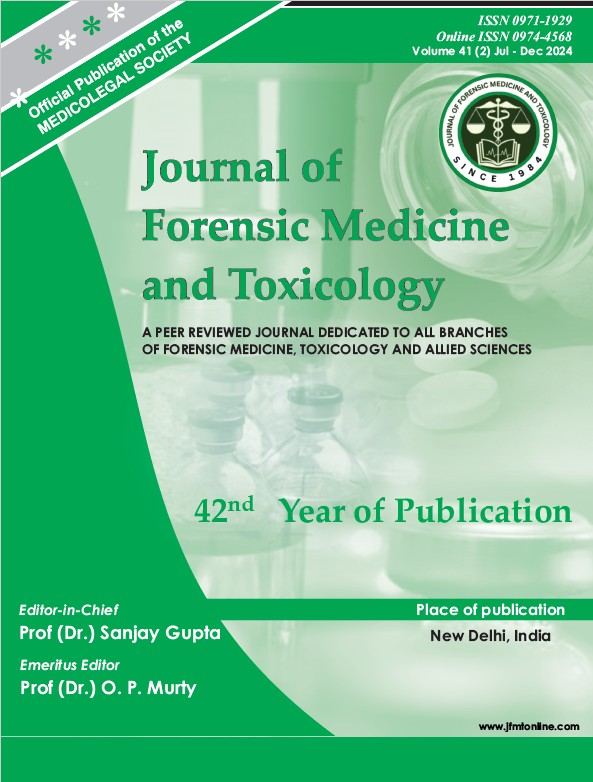FATAL CATTLE ATTACKS - AN OCCUPATIONAL HAZARD AMONG CATTLE REARERS
DOI:
https://doi.org/10.48165/jfmt.2024.41.2.41Keywords:
cattle, attack, trauma, injuries, chest, spinal, head, occupational hazardAbstract
Animals, especially cattle, have long been integral to many cultures and vital to rural populations’ daily lives. However, these cattle sometimes turn violent and attack, causing severe life-threatening injuries with their various appendages, resulting in high-energy body trauma. The present article discusses series of four occupational fatalities cases among untrained cattle rearers due to cattle attacks. A fifty-year-old farmer was attacked by his bull when he was taking the bull for tying at the cattle pen, suffering chest injuries. In another incident, while rearing a bull, the bull attacked a thirty-four-year-old female farmer, and she suffered neck and spinal injuries and succumbed to the injuries six days later. A sixty-six year-old farmer shifting a pregnant cow for the cattle pen was stomped on and suffered fatal head and spinal injuries. A forty-two-year-old male was herding his cows along a state highway road when suddenly, one cow strayed towards the middle of the road. In order to get it back, he went towards the cow but was hit by an oncoming bus. He died due to fatal head and chest injuries. Various risk factors contribute to such occupational hazards among cattle rearers, such as inadequate facilities, fencing, gates, and poorly designed feeding and breeding areas. Other factors include working alone and improper handling techniques. Governments should provide proper cattle handling training and focus on cattle-related incidents as these high-velocity traumas pose great danger to human life. The authors also enlist strategies to minimize the risk of fatal cattle attacks among cattle rearers.
Downloads
References
Alegbeleye Bamidele Johnson. A bull gore injury: a rare case report and review of the literature. J Case Rept Img. 2019 Feb 18;27–36.
Dogan KH, Demirci S, Erkol Z, Sunam GS, Kucukkartallar T. Injuries and deaths occurring as a result of bull attack. J Agromedicine. 2008 Oct 29;13(3):191-6.
Fatalities Caused by Cattle — Four States, 2003— 2008. Centers for Disease Control and Prevention (CDC) [Last accessed on 2023 Aug 29]. Available from: https://www.cdc.gov/mmwr/preview/mmwrhtml/ mm5829a2.htm
Raut S, Haridas S, Kachare R. Fatal bull horn injury A case report. Journal of Indian Academy of Forensic Medicine. 2019;41(2):148-50.
Tumram NK, Ambade VN, Dixit PG. Human fatalities caused by animal attacks: a six-year autopsy study. Medico-Legal Journal. 2017 Dec;85(4):194-9.
Cattle population in India from 2016 to 2022, with an estimate for 2023. Statista [Last accessed on 2023 Aug 29]. Available from: https://www.statista.com/ statistics/1181408/india-cattle-population/
Babaji P, Samadi F, Jaiswal JN, Bansal A. Occupational hazards among dentists: A review of literature. Journal of International Dental and Medical Research. 2011 Aug 1;4(2):87-93.
Murphy CG, McGuire CM, O’Malley N, Harrington P. Cow-related trauma: A 10-year review of injuries admitted to a single institution. Injury. 2010 May;41(5):548–50.
Rani M, Rohit SA, Dikshit PC. Injuries by bull horns: patterns and prevention protocols. Anil Aggrawal’s Internet Journal of Forensic Medicine and Toxicology. 2010 Jan 1;11(1):1-26.
Sheldon KJ, Deboy G, Field WE, Albright JL. Bull Related Incidents: Their Prevalence and Nature. J Agromedicine. 2009 Jul 31;14(3):357–69.
Maity S, Puranik A, Baskaran S, Sairam MV, Kompally P, Puranik Sr A. Patterns and management of unprovoked bull attack injuries: a retrospective case series. Cureus. 2022 Dec 29;14(12).
Ketenci HÇ, Boz H, Kýrcý GS, Özer E, Beyhun NE, Büyük Y. An evaluation of traumatic deaths associated with animal attacks: A 10-year autopsy study. Turkish Journal of Trauma and Emergency Surgery. 2022 Mar 1;28(3):254.
Casey GM, Grant AM, Roerig DS, Boyd J, Hill M, London M, Gelberg KH, Hallman E, Pollock J. Farm worker injuries associated with bulls: New York State 1991–1996. AAOHN journal. 1997 Aug;45(8):393-6.




